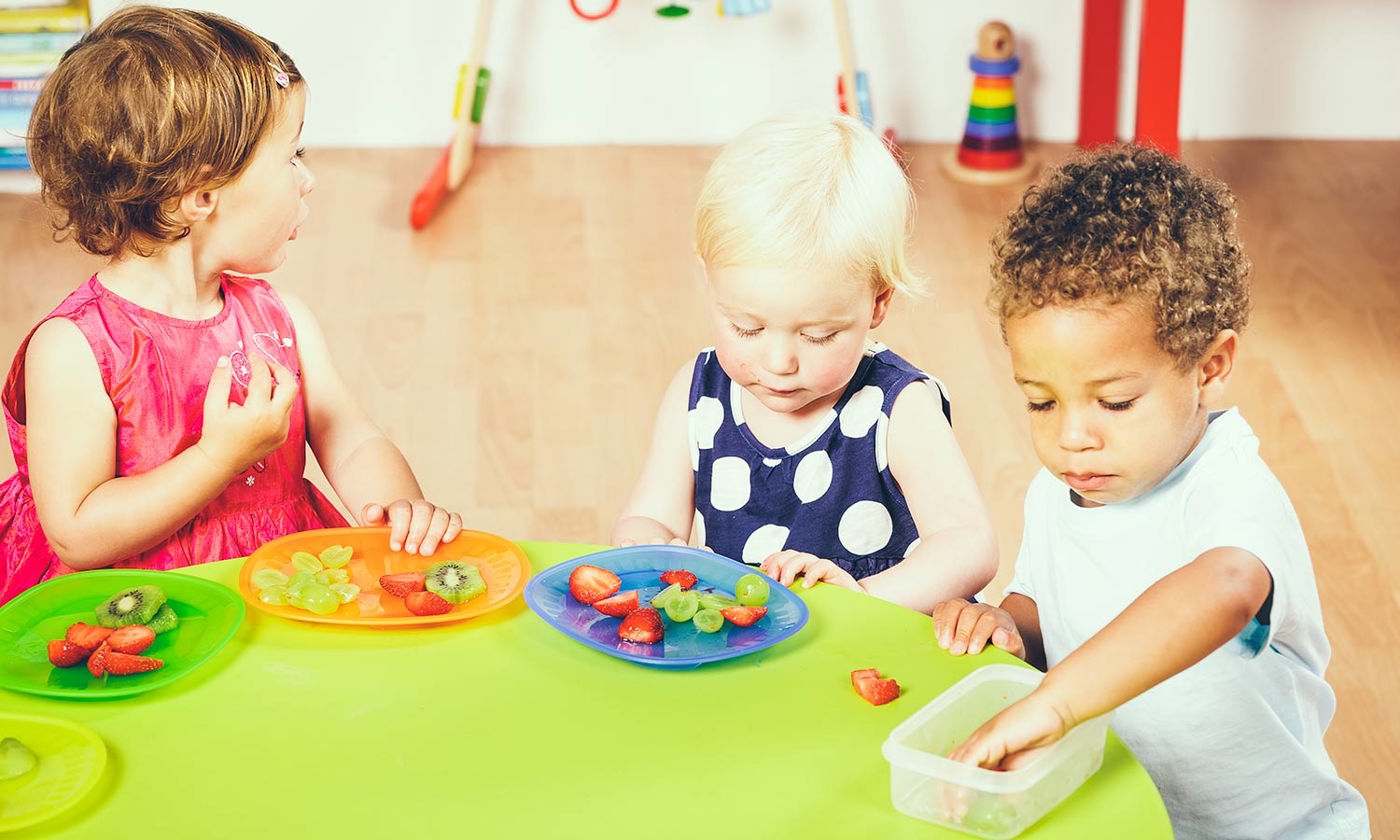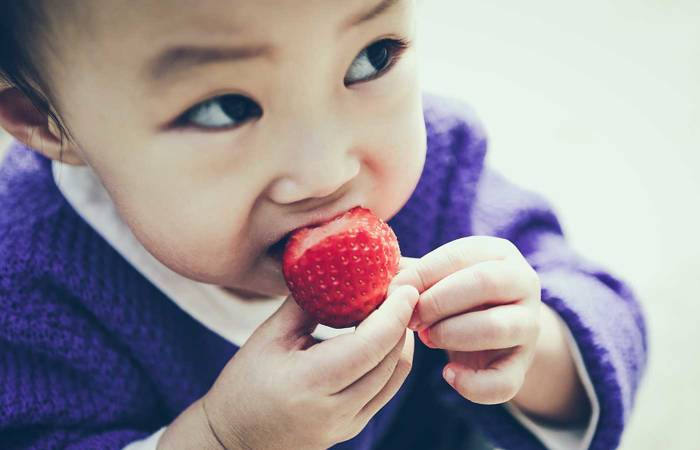Like what you see?
Sign up to receive more free parenting advice.
Thank you for subscribing to our newsletter!
Child Development

Credit: iStock.com/lostinbids
Food pouches have firmly established themselves within the parenting world.
They offer the promise of efficiency, convenience and less mess, both in the kitchen and on the floor beneath the highchair.
Best of all, they are marketed as healthy, nutritious and balanced pureed food (most with the vegetables all parents hope their children will magically crave) for babies having their first taste of solids.
Parents across the world have embraced baby food pouches. A 2015 Nielsen report, found a 28 per cent increase in the worldwide sales of baby food pouches from the previous year.
Food pouches can seem like an asset for parents of six-month-old babies1 who are being introduced to the world of food. Particularly, when parents are surrounded with conflicting information, judgement on whether to puree or do baby-led weaning and the fear lurking in the background of raising a picky eater.
With their increasing popularity has come an increase in questions and rumours about the pouches and their impact on a child’s physical development.
“Feeding is so emotionally charged,” says Tiffany Noble, National Manager, Speech Pathology at Goodstart Early Learning.
“Mums and dads really want their baby to eat and many factors might influence whether their baby can manage different foods or not at different developmental stages. A baby is not born understanding all the aspects of eating, they develop this completely through learning experiences with food and mealtimes.
“Parents can often report feeling like they are always second guessing themselves and this kind of climate can make things really difficult for parents to feel empowered to make the best decision they can.”
Recently, the shine on food pouches has started to dull.
They are getting blamed for causing speech development delays, creating picky eaters and being nutritionally poor.
So, are food pouches really that terrible?
When foods are always pureed and put into a pouch, the child doesn’t see the food and learn what it is that they are eating. It does not help them learn where foods come from, what they look like and how they taste.Konsita Kuswara
Stay up to date with the latest news and articles from First Five Years
Thank you for subscribing to our newsletter!
Food pouches aren’t to be blamed for speech development delays
“Contrary to the current discussions on food pouches and speech development, to my knowledge, there isn’t enough research yet to suggest that food pouches have any detrimental impact on speech development,” says Tiffany.
Tiffany explains that speech errors in children are more often related to phonological processing and nothing to do with articulation.
“If a child says ‘tat’ as opposed to ‘cat’, that is the processing of the phonological (sounds) information of that word, which occurs in the brain,” she says.
“It has nothing to do with how their tongue is moving, or their cheeks or their jaw.”
Tiffany explains that pouches, with the sucking eating action instead of the chewing eating action, don’t lead to speech or language delays.
“It’s a myth that delayed eating skills will have an impact on speech and language,” she says.
“The different articulatory issues children may present with, such as lisps, can relate to the tongue placement, muscle strength and swallowing pattern, but again the research on food pouches specifically contributing to that is not very comprehensive.
“There is not a lot of conclusive evidence to suggest that feeding difficulties have any bearing on speech sound development, and certainly not language skills.
“Whilst we don’t know the exact causes of a language delay, the research suggests the best way to support language development is by increasing their experience of language in the early years.”
Tiffany emphasises that the best way to promote a baby’s communication development is to look for opportunities to have back and forth ‘conversations’ with them.
“I don’t think I can stress this enough.
“Add an extra minute to your nappy change and play peek-a-boo.
“During bath time, share a story and conversation about the duck toy.
“Or copy your child’s actions and make sure it goes back and forth many times.”
There is a chance food pouches can cause picky eaters
“While occasional use of food pouches is not harmful, regularly feeding a baby through food pouches means the baby misses out on critical eating and social skills that may contribute to food pickiness in early childhood,” says PhD Candidate at Deakin University School of Exercise and Nutrition Sciences and Accredited Practising Dietitian Konsita Kuswara.
Konsita explains that food pouches don’t give babies the opportunity to bite and chew and start to use their back molars which can lead to feeding problems.
“When food texture does not progress with the development of the child, they are not challenged to learn how to chew,” she says.
“Later on, when they are given harder food, they tend to gag and refuse to eat anything apart from smooth, refined foods that can be sucked.”
A 2008 study found that babies who were introduced to lumpy solids after the age of nine months ate less of the food groups at seven years old than those introduced between six and nine months old.
In addition, these children at the age of seven reported having significantly more feeding problems.
Konsita adds that if a baby is not exposed to what the food looks like, this could lead to future picky eating problems.
“When foods are always pureed and put into a pouch, the child doesn’t see the food and learn what it is that they are eating,” says Konsita.
“It does not help them learn where foods come from, what they look like and how they taste - most foods in pouches are a combination of several ingredients.
“When children are not familiar with the food, even though they might recognise the taste from pouches, they are less likely to accept it when it’s presented in a different form.”
Konsita mentions that due to most food pouches containing a blend of food (for example an apple and broccoli blend), this may affect their taste for the non-sweet food when it is served on its own.
“While it does not matter nutritionally whether foods are served in combination or as single foods, offering foods as single items assists children to better experience a broad range of tastes and facilitates learning and acceptance to these tastes,” she says.
Are food pouches nutritionally poor?
Most food pouches claim that they have no added sugar, however, as Konsita notes, parents need to first understand sugar before they can understand that their baby’s organic apple food pouch may in fact have more sugar than is recommended.
“Sugar is a form of carbohydrates and can be found naturally from foods such as grains, vegetables, breastmilk or dairy and fruit or as an added sugar from table sugar,” she says.
“Infants aged 7 to 12 months old only require roughly 95 grams of carbohydrates per day and this is easily met by eating a variety of foods from each food group and breast milk/formula.
“There is no nutritional requirement for added sugar.
“However, in the current environment it is very difficult to avoid added sugar and so the World Health Organisation recommends that after two years of age, the intake of added sugar should not exceed five per cent of total energy intake or three teaspoons per day.”
The Australian Dietary Guideline recommends 10 grams of fruit per day for a baby between 7 and 12 months old.
“A small apple is around 100 grams,” says Konsita.
“So, they only need 10 per cent of a small apple.
“Many commercial baby fruit purees will easily contain a whole piece of apple in the pouch plus more.
“So, while sugar may not be added to commercial baby foods, the amount of sugar is still excessive.
“In the longer term, we know food intake tends to track into later childhood, hence a preference for sweet foods early in life may increase caloric intake and place them at higher risk of gaining unhealthy amount of weight later on.”
1 The Department of Health recommends starting solids when a baby is able to hold their head up, unsupported and are six months old, http://www.health.gov.au/internet/publications/publishing.nsf/Content/gug-director-toc~gug-solids






